Unit 5 Do you want to watch a game show? Section A Grammar Focus-3c课件30张
文档属性
| 名称 | Unit 5 Do you want to watch a game show? Section A Grammar Focus-3c课件30张 | 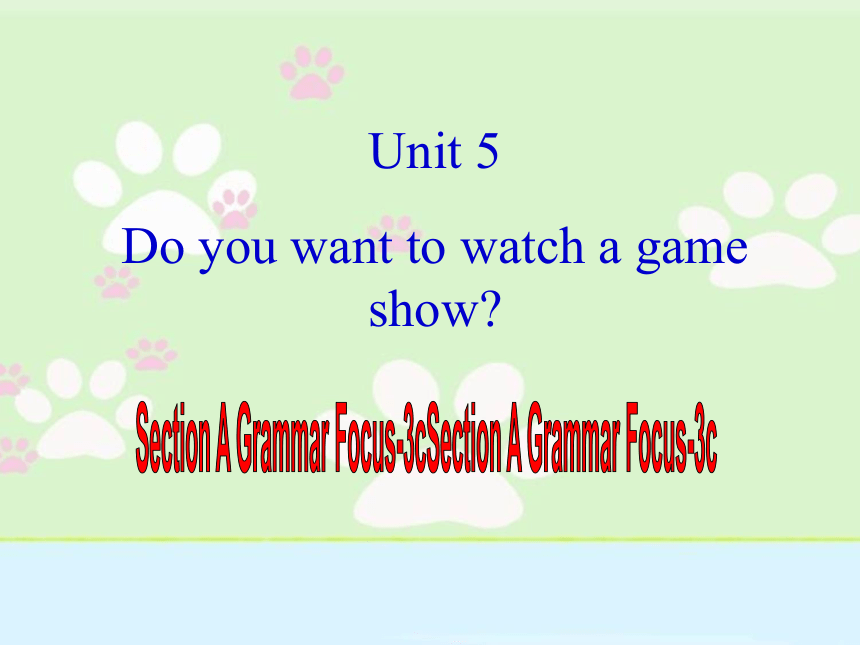 | |
| 格式 | ppt | ||
| 文件大小 | 2.2MB | ||
| 资源类型 | 教案 | ||
| 版本资源 | 人教新目标(Go for it)版 | ||
| 科目 | 英语 | ||
| 更新时间 | 2021-10-15 19:15:19 | ||
图片预览

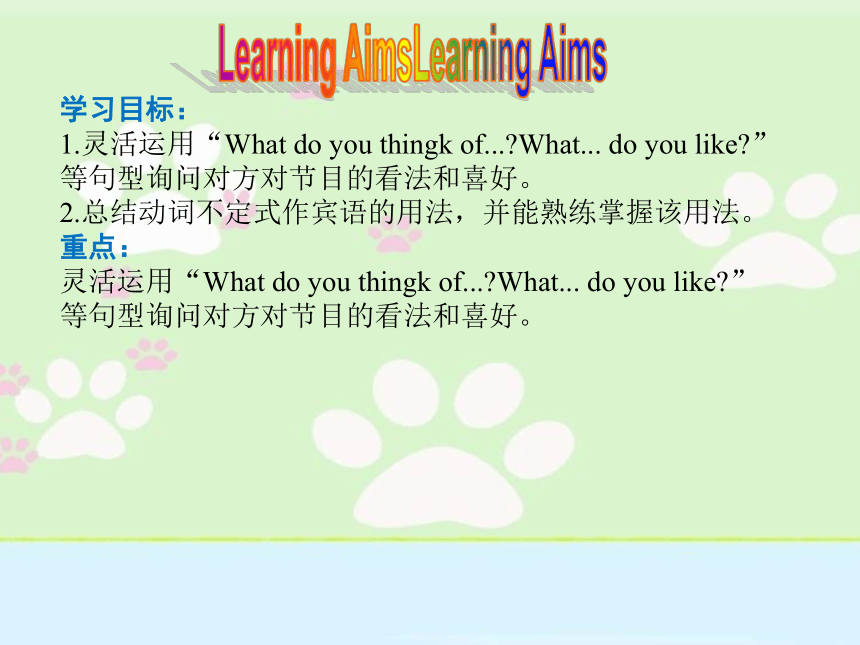
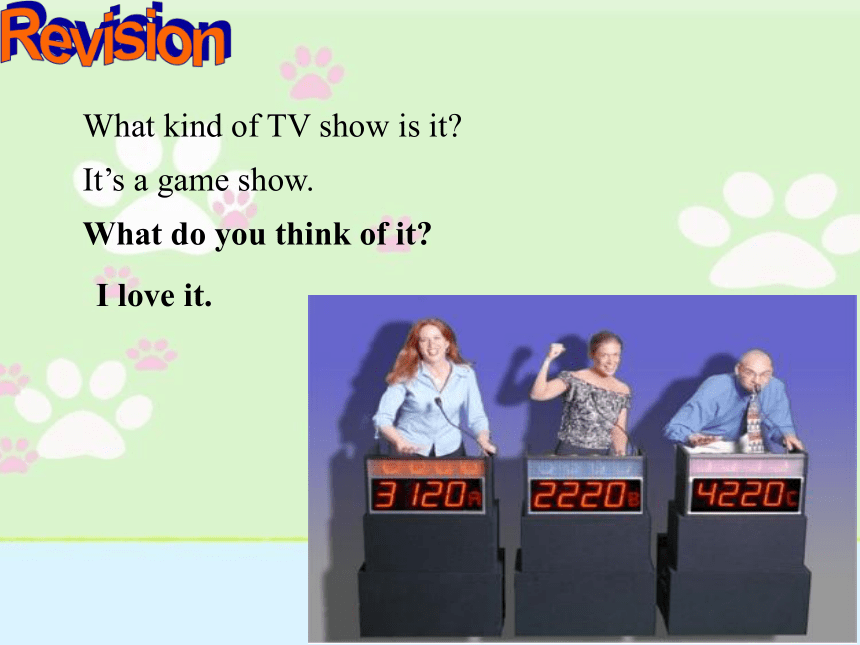
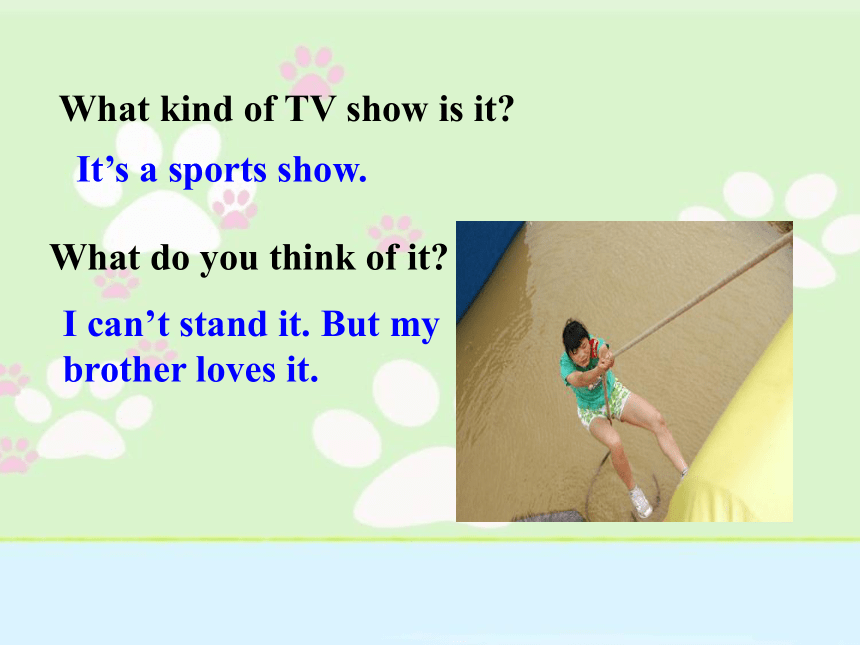
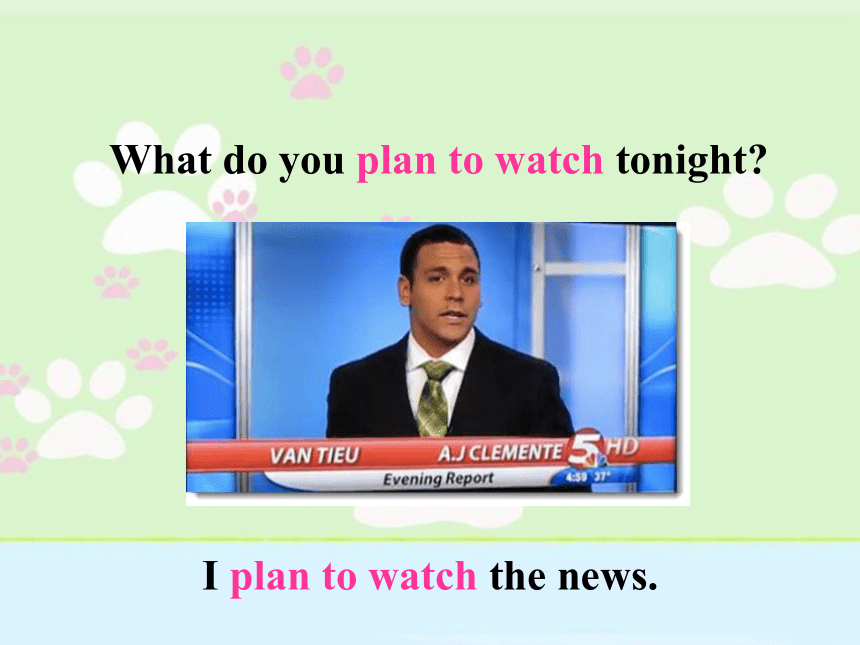
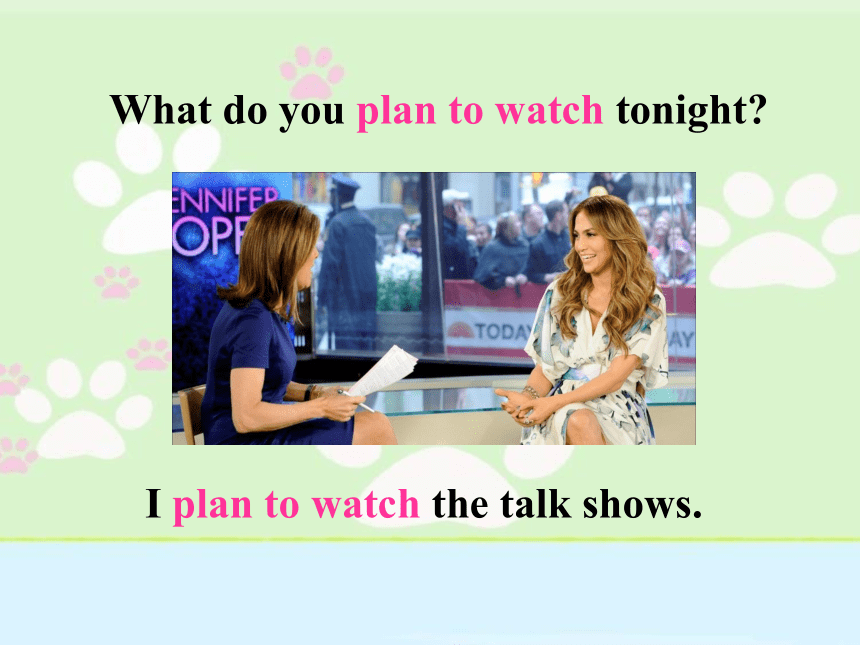

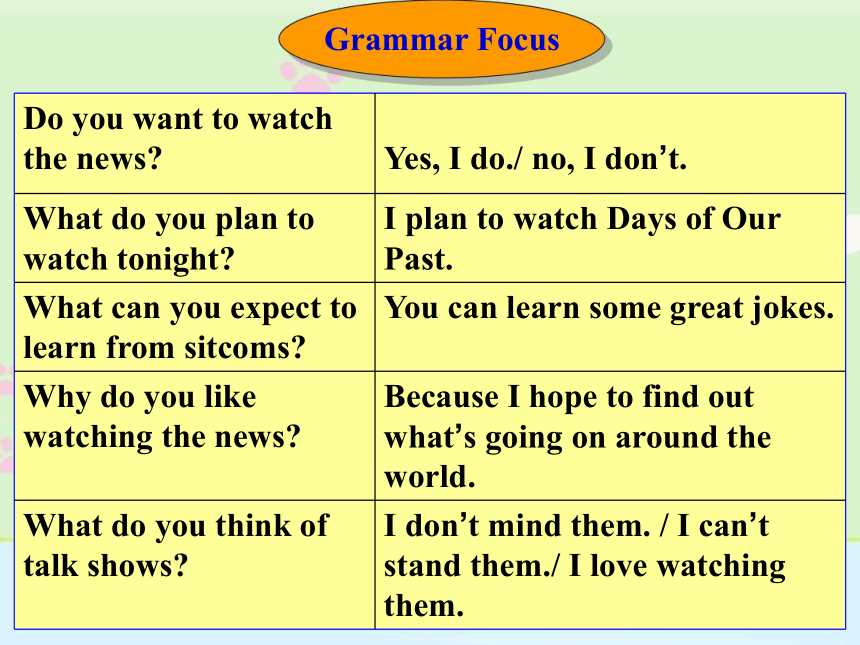
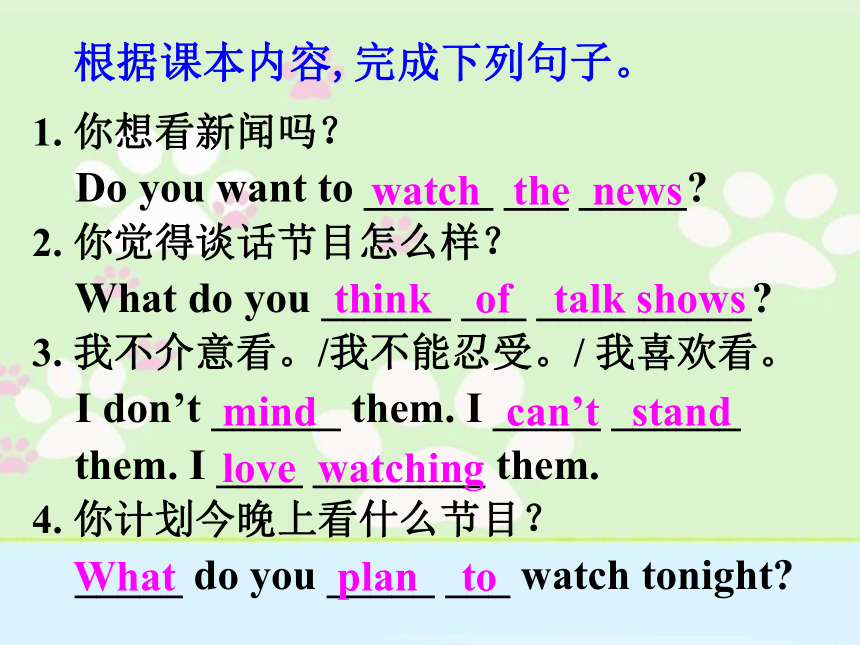
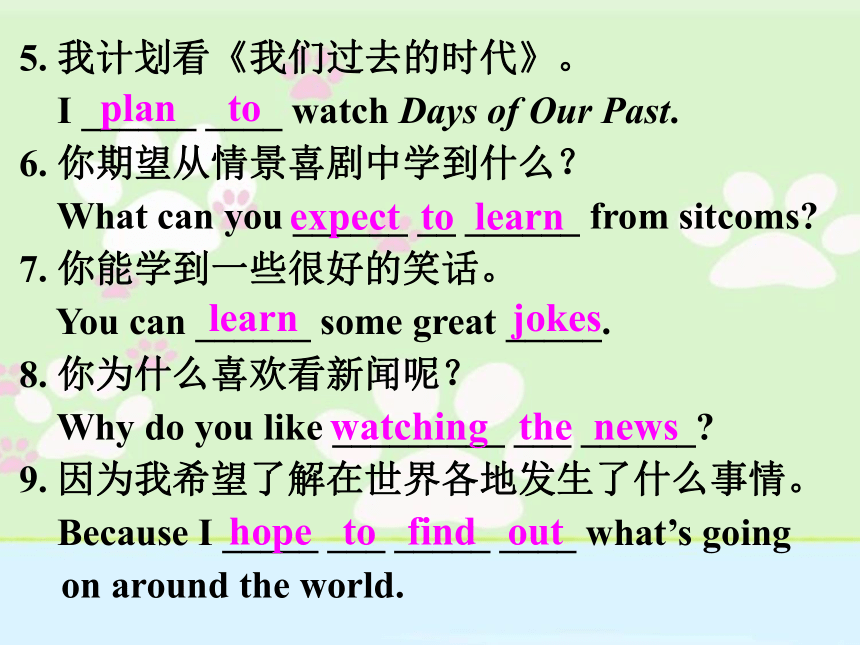
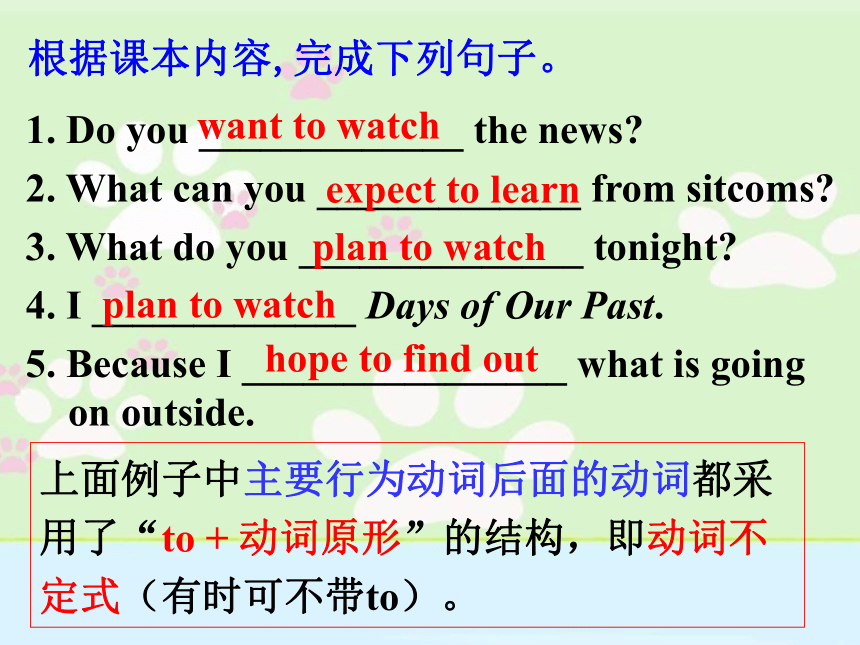
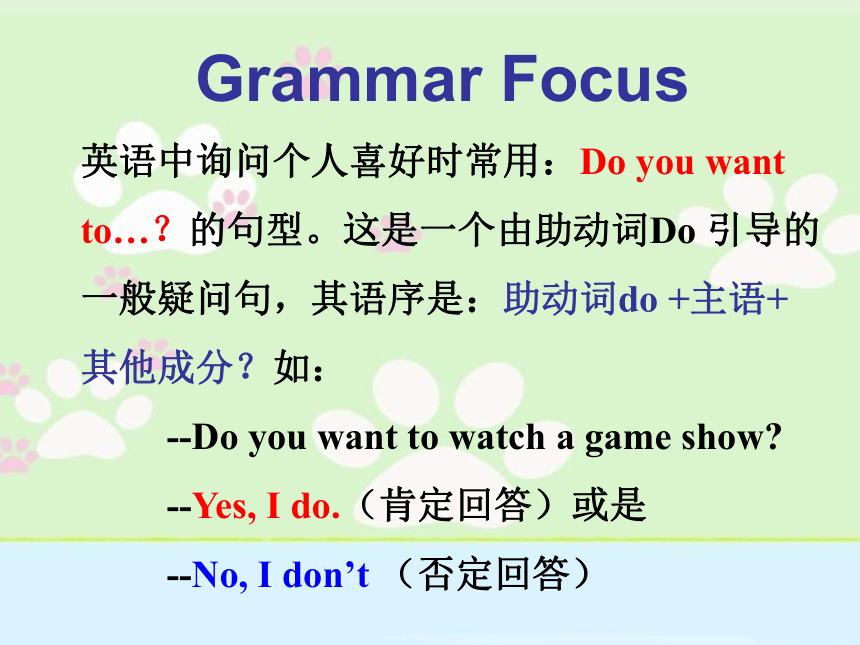
文档简介
(共30张PPT)
Unit 5
Do you want to watch a game show
学习目标:
1.灵活运用“What do you thingk of... What... do you like ”等句型询问对方对节目的看法和喜好。
2.总结动词不定式作宾语的用法,并能熟练掌握该用法。
重点:
灵活运用“What do you thingk of... What... do you like ”等句型询问对方对节目的看法和喜好。
What kind of TV show is it
It’s a game show.
What do you think of it
I love it.
What kind of TV show is it
It’s a sports show.
What do you think of it
I can’t stand it. But my brother loves it.
What do you plan to watch tonight
I plan to watch the news.
What do you plan to watch tonight
I plan to watch the talk shows.
1. joke n. 笑话; 玩笑
常用词组
tell jokes 讲笑话
2. comedy n. 喜剧; 喜剧片
http://zhdduya100./
Do you want to watch the news
Yes, I do./ no, I don’t.
What do you plan to watch tonight I plan to watch Days of Our Past.
What can you expect to learn from sitcoms You can learn some great jokes.
Why do you like watching the news Because I hope to find out what’s going on around the world.
What do you think of talk shows I don’t mind them. / I can’t stand them./ I love watching them.
Grammar Focus
1. 你想看新闻吗?
Do you want to ______ ___ _____
2. 你觉得谈话节目怎么样?
What do you ______ ___ __________
3. 我不介意看。/我不能忍受。/ 我喜欢看。
I don’t ______ them. I _____ ______ them. I ____ ________ them.
4. 你计划今晚上看什么节目?
_____ do you _____ ___ watch tonight
think of talk shows
watch the news
mind
can’t stand
根据课本内容,完成下列句子。
love watching
plan to
What
5. 我计划看《我们过去的时代》。
I ______ ____ watch Days of Our Past.
6. 你期望从情景喜剧中学到什么?
What can you ______ __ ______ from sitcoms
7. 你能学到一些很好的笑话。
You can ______ some great _____.
8. 你为什么喜欢看新闻呢?
Why do you like _________ ___ ______
9. 因为我希望了解在世界各地发生了什么事情。
Because I _____ ___ _____ ____ what’s going on around the world.
plan to
expect to learn
learn jokes
watching the news
hope to find out
1. Do you _____________ the news
2. What can you _____________ from sitcoms
3. What do you ______________ tonight
4. I _____________ Days of Our Past.
5. Because I ________________ what is going on outside.
want to watch
expect to learn
plan to watch
plan to watch
hope to find out
根据课本内容,完成下列句子。
上面例子中主要行为动词后面的动词都采用了“to + 动词原形”的结构,即动词不定式(有时可不带to)。
英语中询问个人喜好时常用:Do you want to…?的句型。这是一个由助动词Do 引导的一般疑问句,其语序是:助动词do +主语+
其他成分?如:
--Do you want to watch a game show
--Yes, I do.(肯定回答)或是
--No, I don’t (否定回答)
Grammar Focus
常见的跟动词不定式做宾语的动词:
想要 ______ 期望 ______ 希望 _______ 计划 ______ 决定 ______ 开始 _______ 开始 ______ 尝试 ______
动词不定式的形式:to + 动词原形
e.g. Jack wants to buy some flowers for Mr.
Wu. 杰克想给吴老师买些花。
want
expect
hope
plan
decide
begin
start
try
【拓展】省略to的不定式
有些动词后面跟动词不定式时, 应将不定式符号to省去。常见的动词有 let, make, feel, help, watch, hear 等。
e.g. 让我来帮助你。
Let me help you.
你能帮助我打扫房间吗?
Can you help me clean the house
【拓展】后面跟doing的动词
常见的动词有enjoy, finish, practice, mind keep等。
你喜欢看电视吗?
Do you enjoy watching TV.
你完成作业了吗
Did you finish doing your homework
【拓展】后面跟doing/ to do 都可以的动词
常见的动词有like, love, start, begin等。
你喜欢看电视吗?
Do you like watching/ to watch TV.
A: What do you plan to watch on TV tonight
B: I hope to , but I also want
to .
How about you Do you a talk show or ____________
A: Oh, I want to .
3a Make a conversation and then practice it
with a partner.
watch sitcoms
watch news
want to watch
a talent show
watch a talent show
3b Answer these questions. Give
answers that are true for you.
What do you think of
game shows
2. What comedy shows do
you like to watch
3. Do you plan to watch a
sports show tonight
4. What can you expect to
learn from the news
Answer to Q 1:
I really love watching them, because they make me happy and relax.
I like to watch Home With Kids
It's so interesting.
No, I can’t stand it. I think it’s boring.
I hope to know what happened around
the world.
Answer to Q 2:
Answer to Q 3:
Answer to Q 4:
3c Ask your classmates questions and
write their names in the chart.
Find someone who… Students’ names
wants to watch a movie
hopes to watch a sitcom
expects to watch the news
plans to watch a sports show
never wants to watch a game show
1. She expects ________ (arrive) tomorrow.
2. Let’s _______ (watch) talk shows tonight.
3. They hope _______ (visit) the Great Wall next year.
4. Do you plan ______ (find) a part-time job
5. When do you want _____ (go) swimming
to find
to go
to visit
watch
一、用动词的适当形式填空。
to arrive
6. They plan __________(arrive) some time after three.
7. I want to travel because I enjoy __________(see) new places.
8. Jane decided __________(go) to Australia for her holiday.
9. My uncle often helps me _____ (learn) English.
to go
to arrive
seeing
learn
1. We only planned _____ the play for an hour, but in the end, we stayed for three hours.
A. watch B. watches
C. to watch D. watched
C
2. Vivian refuses ______ her children to the weekend training centre for extra classes.
A. to send B. sending
C. sent D. sends
A
3. She wants to _________.
A. swim B. swimming C. swims
A
4. — ____ do you think of the movie — It’s very interesting. I like it.
A. Why B. Which
C. How D. What
D
5. It’s too hot in the classroom. We can’t
___ it. We all ___ up and go out of the
classroom.
A. mind; stand B. stand; stand
C. sit; stand
6. How about _____ out for a walk
A. to go B. going
C. go D. goes
B
B
句式转换
1. I don't mind sports shows.(划线提问)
2.Tom loves Shunliu in My Brother Is Called
Shunliu.(同上)
3. I like game shows.(否定句)
4. His brother likes talk shows.(一般问句)
What do you think of sports shows.
Does his brother like talk shows
What does Tom think of Shunliu in My
Brother Is Called Shunliu.
I don't like game shows.
5. I like soap operas.(变成一般疑问句)
6. Does John like talk shows (作否定回答)
7. Liza likes sitcoms.( 对划线部分提问)
Do you like soap operas
No, he doesn’t.
What does Liza like
根据汉语意思完成英语句子,每空一词。
1. 我弟弟昨天学游泳了。
My brother ______________ ___ _____ yesterday.
2. 她父母打算一周锻炼五次。
Her parents _____ ___ ________ five times a week.
3. 那个小男孩想买一个新玩具。
The little boy _____ ___ _______ a new toy.
learnt / learned to swim
plan to exercise
wants to buy
4. 他们不能忍受太阳镜。你呢?
They can’t _____ the sunglasses. ____________you
5. Tina对运动节目不在乎。
Tina _____ ____ ______ ______
76.Tony认为谈话节目怎么样?他很喜爱它。
What ____Tony think of _____ _____ He ______it.
can’t stand sports shows
does
talk shows
loves
stand
How about
1. Finish the exercises in the workbook.
2. Recite the sentences in Grammar
Focus and make similar sentences.
Unit 5
Do you want to watch a game show
学习目标:
1.灵活运用“What do you thingk of... What... do you like ”等句型询问对方对节目的看法和喜好。
2.总结动词不定式作宾语的用法,并能熟练掌握该用法。
重点:
灵活运用“What do you thingk of... What... do you like ”等句型询问对方对节目的看法和喜好。
What kind of TV show is it
It’s a game show.
What do you think of it
I love it.
What kind of TV show is it
It’s a sports show.
What do you think of it
I can’t stand it. But my brother loves it.
What do you plan to watch tonight
I plan to watch the news.
What do you plan to watch tonight
I plan to watch the talk shows.
1. joke n. 笑话; 玩笑
常用词组
tell jokes 讲笑话
2. comedy n. 喜剧; 喜剧片
http://zhdduya100./
Do you want to watch the news
Yes, I do./ no, I don’t.
What do you plan to watch tonight I plan to watch Days of Our Past.
What can you expect to learn from sitcoms You can learn some great jokes.
Why do you like watching the news Because I hope to find out what’s going on around the world.
What do you think of talk shows I don’t mind them. / I can’t stand them./ I love watching them.
Grammar Focus
1. 你想看新闻吗?
Do you want to ______ ___ _____
2. 你觉得谈话节目怎么样?
What do you ______ ___ __________
3. 我不介意看。/我不能忍受。/ 我喜欢看。
I don’t ______ them. I _____ ______ them. I ____ ________ them.
4. 你计划今晚上看什么节目?
_____ do you _____ ___ watch tonight
think of talk shows
watch the news
mind
can’t stand
根据课本内容,完成下列句子。
love watching
plan to
What
5. 我计划看《我们过去的时代》。
I ______ ____ watch Days of Our Past.
6. 你期望从情景喜剧中学到什么?
What can you ______ __ ______ from sitcoms
7. 你能学到一些很好的笑话。
You can ______ some great _____.
8. 你为什么喜欢看新闻呢?
Why do you like _________ ___ ______
9. 因为我希望了解在世界各地发生了什么事情。
Because I _____ ___ _____ ____ what’s going on around the world.
plan to
expect to learn
learn jokes
watching the news
hope to find out
1. Do you _____________ the news
2. What can you _____________ from sitcoms
3. What do you ______________ tonight
4. I _____________ Days of Our Past.
5. Because I ________________ what is going on outside.
want to watch
expect to learn
plan to watch
plan to watch
hope to find out
根据课本内容,完成下列句子。
上面例子中主要行为动词后面的动词都采用了“to + 动词原形”的结构,即动词不定式(有时可不带to)。
英语中询问个人喜好时常用:Do you want to…?的句型。这是一个由助动词Do 引导的一般疑问句,其语序是:助动词do +主语+
其他成分?如:
--Do you want to watch a game show
--Yes, I do.(肯定回答)或是
--No, I don’t (否定回答)
Grammar Focus
常见的跟动词不定式做宾语的动词:
想要 ______ 期望 ______ 希望 _______ 计划 ______ 决定 ______ 开始 _______ 开始 ______ 尝试 ______
动词不定式的形式:to + 动词原形
e.g. Jack wants to buy some flowers for Mr.
Wu. 杰克想给吴老师买些花。
want
expect
hope
plan
decide
begin
start
try
【拓展】省略to的不定式
有些动词后面跟动词不定式时, 应将不定式符号to省去。常见的动词有 let, make, feel, help, watch, hear 等。
e.g. 让我来帮助你。
Let me help you.
你能帮助我打扫房间吗?
Can you help me clean the house
【拓展】后面跟doing的动词
常见的动词有enjoy, finish, practice, mind keep等。
你喜欢看电视吗?
Do you enjoy watching TV.
你完成作业了吗
Did you finish doing your homework
【拓展】后面跟doing/ to do 都可以的动词
常见的动词有like, love, start, begin等。
你喜欢看电视吗?
Do you like watching/ to watch TV.
A: What do you plan to watch on TV tonight
B: I hope to , but I also want
to .
How about you Do you a talk show or ____________
A: Oh, I want to .
3a Make a conversation and then practice it
with a partner.
watch sitcoms
watch news
want to watch
a talent show
watch a talent show
3b Answer these questions. Give
answers that are true for you.
What do you think of
game shows
2. What comedy shows do
you like to watch
3. Do you plan to watch a
sports show tonight
4. What can you expect to
learn from the news
Answer to Q 1:
I really love watching them, because they make me happy and relax.
I like to watch Home With Kids
It's so interesting.
No, I can’t stand it. I think it’s boring.
I hope to know what happened around
the world.
Answer to Q 2:
Answer to Q 3:
Answer to Q 4:
3c Ask your classmates questions and
write their names in the chart.
Find someone who… Students’ names
wants to watch a movie
hopes to watch a sitcom
expects to watch the news
plans to watch a sports show
never wants to watch a game show
1. She expects ________ (arrive) tomorrow.
2. Let’s _______ (watch) talk shows tonight.
3. They hope _______ (visit) the Great Wall next year.
4. Do you plan ______ (find) a part-time job
5. When do you want _____ (go) swimming
to find
to go
to visit
watch
一、用动词的适当形式填空。
to arrive
6. They plan __________(arrive) some time after three.
7. I want to travel because I enjoy __________(see) new places.
8. Jane decided __________(go) to Australia for her holiday.
9. My uncle often helps me _____ (learn) English.
to go
to arrive
seeing
learn
1. We only planned _____ the play for an hour, but in the end, we stayed for three hours.
A. watch B. watches
C. to watch D. watched
C
2. Vivian refuses ______ her children to the weekend training centre for extra classes.
A. to send B. sending
C. sent D. sends
A
3. She wants to _________.
A. swim B. swimming C. swims
A
4. — ____ do you think of the movie — It’s very interesting. I like it.
A. Why B. Which
C. How D. What
D
5. It’s too hot in the classroom. We can’t
___ it. We all ___ up and go out of the
classroom.
A. mind; stand B. stand; stand
C. sit; stand
6. How about _____ out for a walk
A. to go B. going
C. go D. goes
B
B
句式转换
1. I don't mind sports shows.(划线提问)
2.Tom loves Shunliu in My Brother Is Called
Shunliu.(同上)
3. I like game shows.(否定句)
4. His brother likes talk shows.(一般问句)
What do you think of sports shows.
Does his brother like talk shows
What does Tom think of Shunliu in My
Brother Is Called Shunliu.
I don't like game shows.
5. I like soap operas.(变成一般疑问句)
6. Does John like talk shows (作否定回答)
7. Liza likes sitcoms.( 对划线部分提问)
Do you like soap operas
No, he doesn’t.
What does Liza like
根据汉语意思完成英语句子,每空一词。
1. 我弟弟昨天学游泳了。
My brother ______________ ___ _____ yesterday.
2. 她父母打算一周锻炼五次。
Her parents _____ ___ ________ five times a week.
3. 那个小男孩想买一个新玩具。
The little boy _____ ___ _______ a new toy.
learnt / learned to swim
plan to exercise
wants to buy
4. 他们不能忍受太阳镜。你呢?
They can’t _____ the sunglasses. ____________you
5. Tina对运动节目不在乎。
Tina _____ ____ ______ ______
76.Tony认为谈话节目怎么样?他很喜爱它。
What ____Tony think of _____ _____ He ______it.
can’t stand sports shows
does
talk shows
loves
stand
How about
1. Finish the exercises in the workbook.
2. Recite the sentences in Grammar
Focus and make similar sentences.
同课章节目录
- Unit 1 Where did you go on vacation?
- Section A
- Section B
- Unit 2 How often do you exercise?
- Section A
- Section B
- Unit 3 I'm more outgoing than my sister.
- Section A
- Section B
- Unit 4 What's the best movie theater?
- Section A
- Section B
- Unit 5 Do you want to watch a game show?
- Section A
- Section B
- Unit 6 I'm going to study computer science.
- Section A
- Section B
- Unit 7 Will people have robots?
- Section A
- Section B
- Unit 8 How do you make a banana milk shake?
- Section A
- Section B
- Unit 9 Can you come to my party?
- Section A
- Section B
- Unit 10 If you go to the party, you'll have a grea
- Section A
- Section B
